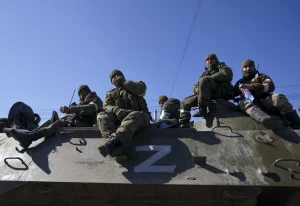
NYT: Surovikin knew in advance about Prigozhin's plans to start rebellion in Russia. The Kremlin reacts
The US believes that the deputy commander of the occupation forces, Sergei Surovikin, knew in advance about the plans of the leader of the Wagner PMC, Yevgeny Prigozhin, to stage a coup in Russia. The Kremlin reacted to this statement
A senior Russian general knew in advance of Yevgeny Prigozhin’s plans to rebel against Russia’s military leadership, The New York Times reported with reference ato US officials briefed on American intelligence on the matter.
According to them, Washington is now trying to find out whether Surovikin helped Prigozhin plan a rebellion against the Russian authorities.
It is noted that there are signs that other Russian generals supported Prigozhin's attempt to change the leadership of the Russian Defence Ministry. Current and former US officials believe that Prigozhin would not have launched the rebellion if he did not believe he had help.
Now Putin must decide whether he believes in Surovikin's help for Prigozhin and how to respond. For now, analysts say, Putin seems intent on blaming the rebellion solely on Prigozhin.
US officials have suggested that an alliance between Sergei Surovikin and Yevgeny Prigozhin could explain why Prigozhin is still alive.
The elimination of Surovikin, who is seen in the US as more competent and ruthless than other members of the Russian command, would undoubtedly benefit Ukraine, which has launched a counter-offensive.
On Wednesday, June 28, Putin's spokesman Dmitry Peskov commented on the publication and said it was "speculation".
"Now there will be a lot of different speculations, gossip and so on around these events. I think this is one such example," he said, insisting that Russia’s army and people had unified around Putin.
Prigozhin's mutiny in Russia
The conflict between Wagner PMC financier Yevgeny Prigozhin and the Russian Ministry of Defence continued for several months, but the situation escalated sharply on the evening of 23 June.
Allegedly, Russian troops launched a missile attack on the Wagner base. Yevgeny Prigozhin, the leader of the Wagner PMC, announced a "march of justice" and stated that 25,000 mercenaries were heading to Moscow after the Russian leadership refused to hand over Defense Minister Sergei Shoigu and Chief of the General Staff Valery Gerasimov.
On Saturday, June 24, in addition to Rostov-on-Don, where they initially gathered around the headquarters of the Southern Military District, the Wagner group also took control of Voronezh. Their convoys, which had diverted from the Ukrainian border, were moving towards Moscow. Military aircraft and artillery under Shoigu's control attempted to stop them. The units of Wagner PMC were last spotted in the Lipetsk region. In Moscow itself, defensive positions were established, trenches were dug, and all security forces were mobilized.
However, on the evening of June 24, the press service of the self-proclaimed President of Belarus, Alexander Lukashenko, released a statement in which the head of the Wagner PMC stated that he was ready to stop the advance of his mercenaries' military convoys, which were already approaching Moscow, and to reach an agreement with the Kremlin. Prigozhin allegedly agreed on this during a conversation with Lukashenko.
Instead, Prigozhin announced that the Wagner group had stopped their advance and returned to their field camps before reaching 200 km from Moscow. He stated, "In a day, we covered a long distance, stopping only 200 km away from Moscow. During this time, no blood was shed. However, the moment may come when blood will be spilled. Therefore, taking full responsibility, we are turning our columns around and heading back to the field camps as planned."
Subsequently, Prigozhin and all his fighters left the headquarters of Russia's Southern Military District. Russian leader Vladimir Putin promised that Prigozhin would be able to go to Belarus, and Russia would close the criminal case against him.
Read more on the events here.
The deal reached through Lukashenko's mediation is likely to eliminate the Prigozhin-led Wagner PMC in its current form, although some elements of the organization may continue to exist under the Russian Defense Ministry, according to the Institute for the Study of War.
On June 26, Russian media reported that the leader of PMC Wagner remained under investigation in the case of organizing a coup in Russia, despite the Kremlin's statements about closing the case.
On the same day, Putin gave a speech in which he offered the Wagner PMC fighters three options for future actions: join the Russian Defense Forces, go to Belarus with other PMC members, or return to their families.
Meanwhile, Wagner leader, Yevgeny Prigozhin, said that the main goal of the mutiny was "to prevent the destruction of the Wagner PMC, not to overthrow the government" and called it a "march of justice." He also claimed that the offensive on Moscow had stopped because the mercenaries "did not want to shed much blood."
On 27 June, Russia's Federal Security Service announced that it stopped a criminal case on armed rebellion involving the leader of the Wagner PMC, Yevgeny Prigozhin.
The Russian Ministry of Defence claimed that Wagner's fighters would hand over heavy equipment to the Russian regular army.
On the same day, the self-proclaimed president of Belarus confirmed the arrival of Yevgeny Prigozhin in the country. According to him, the Wagner soldiers who arrived with him will not guard the Russian tactical nuclear weapons deployed there.
Read more about the course of events during the Wagner mutiny here.
- News












































